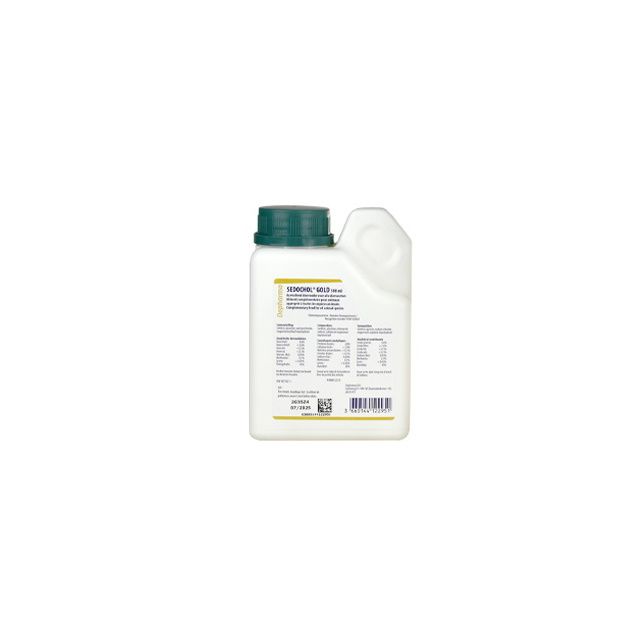The liver of the dog
Also in dogs, the liver is an indispensable organ that performs many important functions, including removing waste products from the blood. When the liver doesn't function properly, these processes are disrupted. Dogs with liver problems often initially have vague symptoms but can become seriously ill. Pharmacy4pets offers various dietary supplements that can support liver function.
The function of the liver
The liver has several important functions and is also known as the body's factory. The main functions of the liver are:
- Removing waste products from the blood: harmful substances are broken down and removed in the liver. When digesting proteins from food, the waste product ammonia is produced. Because this ammonia is toxic, the liver converts ammonia into urea. This substance is then excreted by the kidneys through urine. Additionally, the liver also removes foreign substances from the blood, such as medication.
- Production of proteins: most of the proteins found in the blood are made in the liver, including the proteins responsible for blood clotting.
- Processing of fats.
- Aiding in digestion.
In case of a liver problem, all these functions or part of them are disrupted.
Symptoms of liver problems in dogs
The symptoms of liver problems in dogs are often vague. Other diseases can cause similar problems. However, jaundice is a specific sign that something is wrong with the liver or bile ducts. Symptoms of liver diseases can include:
- Vomiting and diarrhea.
- Increased drinking and urination.
- Blood in urine due to bladder stones.
- Nausea, poor appetite, and weight loss.
- Failure to grow.
- Jaundice (yellowing of the whites of the eyes, mucous membranes, and skin).
- Fluid in the abdominal cavity (ascites).
- Increased tendency to bleed.
- Abnormal behavior: lethargy, drowsiness, appearing blind, walking in circles, wanting to walk through walls, epileptiform seizures.
Liver problems in dogs
There can be several things wrong with a dog's liver. Some common liver diseases include:
- Liver shunt: In a liver shunt, a blood vessel is improperly formed, causing blood to bypass the liver instead of passing through it. As a result, certain toxic substances, such as ammonia, are not converted in the liver but remain in the blood and can cause severe neurological symptoms. Puppies with a liver shunt often grow very poorly. Bladder stones can also develop due to a liver shunt.
- Acute hepatitis (liver inflammation): Dogs with acute hepatitis are often very ill, have high fever, vomit, and have diarrhea. They also often appear jaundiced.
- Chronic hepatitis: Dogs with chronic liver inflammation usually have vague symptoms such as lethargy, poor appetite, weight loss. Sometimes they drink more than normal.
They may also experience jaundice and/or retain fluid in the abdominal cavity (ascites).
Hepatitis can result from a congenital disease (such as copper storage disease) or an autoimmune disease. Copper storage disease occurs in Labrador Retrievers, Bedlington Terriers, Doberman Pinschers, all Spaniels, West Highland White Terriers, Skye Terriers, and Dalmatians. - Bile duct problems: Bile is produced in the liver, stored in the gallbladder before being excreted via feces. Diseases of the bile ducts, such as gallstones, gallbladder inflammation, tumors, or a mucus plug in the gallbladder (mucocoele), usually cause jaundice, weight loss, pale stools, and abdominal pain.
- Leptospirosis: The bacterial disease Leptospirosis, or Weil's disease, can be transmitted via the urine of rats or other dogs. This disease causes liver and kidney failure and is also dangerous for humans. Annual vaccination helps protect against leptospirosis.
- Liver tumors: The most common liver tumor is malignant lymphoma. Liver metastases from tumors elsewhere in the body are also frequently seen.
Diagnosis of liver problems in dogs
When liver problems are suspected, your veterinarian will usually start with a blood test. In the blood, an increase in liver enzymes (ALP and ALT), bile acids, and/or bilirubin may indicate that something is wrong with the liver. Further investigation is needed to determine the exact cause of an elevation in these blood values. Often, the next step is an abdominal ultrasound to visualize the liver, possibly with biopsies taken. Additional blood tests (such as ammonia or coagulation studies) may also be necessary.
Treatment of liver problems in dogs
Of course, the treatment of liver problems in dogs depends on the cause and severity.
If a dog with hepatitis is very ill, hospitalization is often necessary. The dog will then receive medication, fluids, and nutrients via an intravenous drip. Depending on the cause of the liver inflammation, treatment with copper binders or anti-inflammatory drugs may be necessary.
Dogs with a liver shunt can often be cured by surgery. In some cases, a special low-protein liver diet combined with a specific laxative is sufficient to control the symptoms.
Liver tumors can sometimes be surgically removed or successfully treated with chemotherapy. Unfortunately, the prognosis is often very poor with metastases. Dogs with leptospirosis need intensive treatment with intravenous fluids and antibiotics.
Nutrition for liver problems
Some liver problems can be addressed with special dietary food. Some dogs with a liver shunt are symptom-free with a specific diet and lactulose.
In any case, dogs with various liver problems can be well supported with dietary supplements. Silybin is the main component of milk thistle (Silybum marianum). Silybin has been shown to help support normal liver function.
Silybin can be found in Silycure and Zentonil Advanced. The latter also contains an important antioxidant (SAMe), which is often deficient in liver disease.
Because the liver is such an important organ, it is important to recognize liver problems and treat them appropriately. Pharmacy4pets helps support your dog's healthy liver function. If you have any questions about our products or about liver problems in your dog, please contact us.



